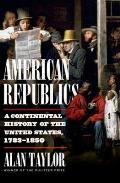Visiting the American Republics
Two historians I follow on Twitter published reviews of Alan Taylor’s American Republics: A Continental History of the United States, 1783–1850 last week.
For The New Criterion, Daniel N. Gullotta of Stanford and the Age of Jackson podcast wrote:
For The New Criterion, Daniel N. Gullotta of Stanford and the Age of Jackson podcast wrote:
Taylor’s history incorporates Canadian, Mexican, and Native American perspectives to recount the birth of the early Republic and the rise of American democracy. Taylor’s sources, which also include material from European diplomats and foreign travelers, offer unique insights on episodes routinely covered in similar books. International events loom particularly large in the mind of his antebellum American subjects, such as the establishment of Haiti as a free black republic in 1804, the various Latin American revolutions that erupted throughout the early nineteenth century, and the United Kingdom’s Slavery Abolition Act of 1833.The Washington Post commissioned its review from Colin Woodard, author of American Nations and Union and journalist at the Portland Press Herald:
While other works have shown how involved Americans were in regional events and national politics, Taylor demonstrates their keen awareness of foreign events and global changes, too. They were, for instance, angry that Canadians and Britons thought of the United States as a nation of irresponsible drunks, ill-tempered ruffians, and hypocritical slavers. . . .
Even the Americans who did want to expand the nation’s borders rarely did so out of a national sense of shared destiny, but rather out of regional self-interest. The absence of early American nationalism in this period might surprise readers, who will find more figures proudly willing to call themselves Virginians, Georgians, or New Yorkers than Americans. This regionalism and the issue of slavery made for a young nation full of anxiety and built on fragile alliances, ready to break out into civil war at almost any moment.
The takeaway is that this era of conquest and expansion was a time of anguish and acrimony for U.S. leaders — manifest uncertainty — and terrible tragedy for many of the continent’s inhabitants. In an effort to achieve security for its White citizens — to protect them from imperial rivals, native nations and enslaved-person uprisings — the United States aggressively expanded. The effort instead triggered the Civil War, as the balance of power between slave and free states became impossible to maintain. . . .In addition, Taylor did a podcast interview with Lewis Lapham.
For Americans used to the comforting myth of an exceptional union boldly leading humanity in a better direction, this account may sting. Taylor doesn’t seek to salve such pain, but neither has he written a polemic. Diligently researched, engagingly written and refreshingly framed, “American Republics” is an unflinching historical work that shows how far we’ve come toward achieving the ideals in the Declaration — and the deep roots of the opposition to those ideals.


No comments:
Post a Comment